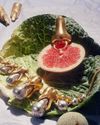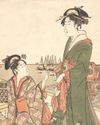
To leave no stone unturned indicates taking a thorough approach to an endeavour or pursuit, but it may very well also refer to the use of stones in beauty therapy. From the jade used in rollers to the smooth basalt pebbles used in hot stone massages, people have found myriad uses for stones for the face and body for many years. Using stones in beauty and wellness treatments dates back to seventh-century China, seen in practices such as gua sha, where a tool (today typically made from jade or rose quartz) is used to scrape the skin in order to produce light petechiae in order to remove “wind” from the body, a concept in traditional Chinese medicine. While many of these therapies are still widely practised in Asia today, the proper training and technique is essential in order not to cause injury to the skin.
AT HOME
The jade or stone roller has taken off as a home massage tool, probably because of its wide availability and relative affordability. Like gua sha, the jade roller — sometimes made from marble, rose quartz or other stones instead — has been used for centuries for lymphatic drainage, a form of massage that pushes fluids toward the lymph nodes in order to encourage drainage. Most aestheticians recommend applying minimal pressure when using a roller, as the natural weight from the relatively heavy stone will do the job. Too much pressure might result in skin irritation and broken capillaries. It is also important to sanitise the tool with alcohol before each use. Adding a serum or moisturiser reduces friction while rolling helps skincare penetrate the skin — a plus when using multiple layers of different products. Following the principles behind lymphatic drainage, the neck must be rolled first, before starting on the face in order to clear the lymph passages.
Denne historien er fra December 2020-utgaven av T Singapore: The New York Times Style Magazine.
Start din 7-dagers gratis prøveperiode på Magzter GOLD for å få tilgang til tusenvis av utvalgte premiumhistorier og 9000+ magasiner og aviser.
Allerede abonnent ? Logg på
Denne historien er fra December 2020-utgaven av T Singapore: The New York Times Style Magazine.
Start din 7-dagers gratis prøveperiode på Magzter GOLD for å få tilgang til tusenvis av utvalgte premiumhistorier og 9000+ magasiner og aviser.
Allerede abonnent? Logg på

Look At Us
As public memorials face a public reckoning, there’s still too little thought paid to how women are represented — as bodies and as selves.

Two New Jewellery Collections Find Their Inspiration In The Human Anatomy
Two new jewellery collections find their inspiration in the human anatomy.

She For She
We speak to three women in Singapore who are trying to improve the lives of women — and all other gender identities — through their work.
Over The Rainbow
How the bright colours and lively prints created by illustrator Donald Robertson brought the latest Weekend Max Mara Flutterflies capsule collection to life.

What Is Love?
The artist Hank Willis Thomas discusses his partnership with the Japanese fashion label Sacai and the idea of fashion in the context of the art world.

The Luxury Hotel For New Mums
Singapore’s first luxury confinement facility, Kai Suites, aims to provide much more than plush beds and 24-hour infant care: It wants to help mothers with their mental and emotional wellbeing as well.

Who Gets To Eat?
As recent food movements have focused on buying local or organic, a deeper and different conversation is happening among America’s food activists: one that demands not just better meals for everyone but a dismantling of the structures that have failed to nourish us all along.

Reimagining The Future Of Fashion
What do women want from their clothes and accessories, and does luxury still have a place in this post-pandemic era? The iconic designer Alber Elbaz thinks he has the answers with his new label, AZ Factory.

A Holiday At Home
Once seen as the less exciting alternative to an exotic destination holiday, the staycation takes on new importance.
All Dressed Up, Nowhere To Go
Chinese supermodel He Sui talks about the unseen pressures of being an international star, being a trailblazer for East Asian models in the fashion world, and why, at the end of the day, she is content with being known as just a regular girl from Wenzhou.